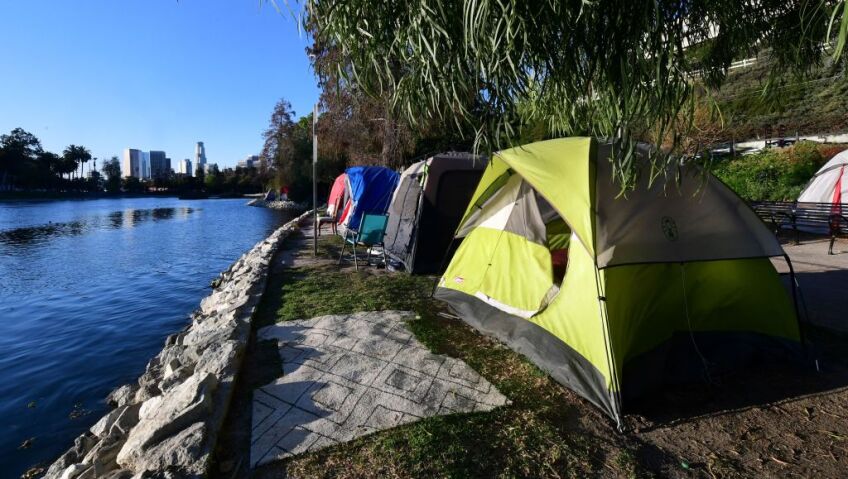Echo Park Lake Reopens Following Cleanup and Homeless Relocation Controversy

LOS ANGELES (CNS) - Echo Park Lake reopened to the public today, two months after the park was closed following the relocation of about 200 homeless people who had taken up residence there, and anger over their removal continued to boil over.
Councilman Mitch O'Farrell, who came under fire from some homeless advocates during the effort to place the park residents into alternative housing, was among the first to walk into the park when it reopened at 3 p.m. Wednesday. He was quickly surrounded by a group of advocates, some of whom broke into chants of "Shame on Mitch." Others called for his resignation.
The park is marked with signs announcing that no camping, lodging or storage is permitted in the park. One sign warns that personal property left in the park after closing time "may be removed and impounded," and could be discarded if not claimed within 90 days. The park hours are marked as 5 a.m. to 10:30 p.m.
The reopening came after L.A. Sanitation and Environment crews removed what they quantified as 35.7 tons of solid waste from the location. The park underwent $600,000 worth of cleaning and repairs, including replacing playground surfacing, upgrading restrooms and exterior lighting fixtures to LED, replacing five drinking fountains, improving light poles in the area, improving and painting the exterior of the lake's boathouse, improving the lake bridge, refurbishing the park's turf and improving irrigation.
Also back in service at the park Wednesday were the popular swan pedal-boats, allowing people to venture onto Echo Park Lake.
Word spread on March 22 that the park would be closed for repairs, but many in the community saw it as a veiled effort to remove the hundreds of unhoused Angelenos who took up residence in the park.
The removal effort was met with large protests, in which officers arrested 182 people. Protesters blasted the city for forcing the park's residents out of an area that had grown into what they called a supportive community — including a vegetable garden, working showers and a shared kitchen.
Many neighbors had complained about increasing trash at the park, and said they no longer felt safe there. O'Farrell and Mayor Eric Garcetti said the site had become dangerous, with drug overdoses and four deaths taking place there.
"For over a year, my team worked tirelessly to provide resources, services and ultimately transitional housing to people experiencing homelessness at Echo Park Lake," O'Farrell said earlier.
"As time went on, conditions at the park became increasingly unsafe for everyone — park visitors and park dwellers. Echo Park Lake is a shared public space, and unhoused people were existing in inhumane conditions — which is why every single person experiencing homelessness in the park was offered transitional housing and services."
While O'Farrell and Garcetti declared the operation a success, opponents of the park's clearing, including a coalition of faculty at USC, UCLA, UC Irvine and Occidental College, pointed out that most of the housing options were temporary and some were in congregate shelters amid a pandemic.
"First, placements into interim shelter must not be equated with housing people," the faculty stated in a letter to the city on March 31.
"Without a clear path to permanent housing, such temporary housing serves as yet one more stop in the endless cycle of displacement. Many of the Echo Park Lake placements were made to Project Roomkey hotels and motels, in locations as distant as Palmdale."
They added that some Project Roomkey residents claim they live under strict curfews and prison-like conditions while living in the city-provided hotels, and they feel like they have to "trade their autonomy and dignity for a bed."
Project Roomkey residents formed an organization, Unhoused Tenants Against Carceral Housing, and scheduled a news conference outside City Hall on Wednesday to demand better treatment in Project Roomkey housing.
They claim they experience "debilitating curfews that prevent them from getting to/from steady employment, confiscation of survival supplies like food and eating utensils, extreme social isolation, harassment from security, complete lack of privacy, no transparency about their future in the program and other punitive rules that further marginalize the poorest Angelenos," according to a statement from the organization.









